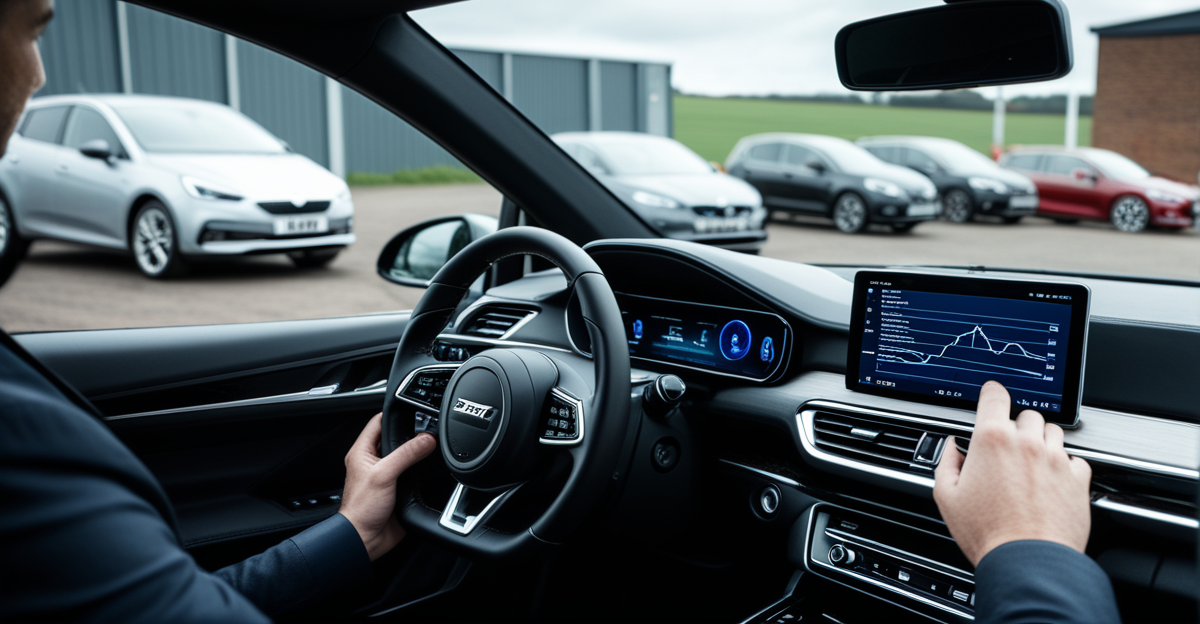Data Analytics Transforming the UK Automotive Industry
Data analytics plays a pivotal role in shaping innovation within the UK automotive industry. By leveraging vast amounts of automotive data science, companies in the sector develop advanced insights that improve operational efficiency and foster groundbreaking vehicle technologies.
Key areas where data analytics is applied include manufacturing process optimisation, product development, and customer experience enhancement. For example, real-time data analysis enables manufacturers to identify production bottlenecks and quality issues swiftly, reducing downtime and costs. Additionally, automotive data science supports the design of smarter, more personalised vehicles by interpreting driver behaviour and preferences.
Also read : What role does sustainability play in the UK’s automotive innovation?
Data-driven strategies significantly influence the UK automotive industry’s competitiveness on a global scale. Those leveraging data analytics effectively can anticipate market trends faster, streamline supply chains, and accelerate innovation cycles. This approach not only boosts productivity but also drives sustainable practices and fosters continuous improvement.
Ultimately, data analytics fuels a culture of innovation within the UK automotive industry, enabling companies to adapt quickly to evolving technologies and consumer demands while maintaining a leadership position in the international market.
Additional reading : How is the UK automotive market adapting to changing environmental regulations?
Technology and Methodologies Utilised by UK Automotive Companies
Advancements in automotive technologies have propelled the UK automotive industry to adopt cutting-edge tools such as AI in automotive systems, machine learning algorithms, and big data platforms. These technologies generate immense volumes of data, enabling companies to harness predictive analytics for more accurate vehicle development and lifecycle management. For instance, predictive models can forecast component failures, allowing timely interventions that reduce maintenance costs and improve reliability.
Integration of IoT devices and cloud computing bolsters real-time data processing, giving manufacturers instant insights into vehicle performance and production workflows. This seamless connectivity facilitates dynamic decision-making and accelerates innovation cycles.
Machine learning techniques are employed to analyze sensor data collected from test vehicles, creating detailed models identifying optimal design parameters or driving behaviours. AI in automotive applications further refines autonomous system capabilities and enhances safety features, exemplifying innovation driven by data analytics.
Overall, these methodologies equip UK automotive companies with advanced tools to stay competitive through smarter, data-informed strategies. The synergy between big data, AI, and predictive analytics is shaping an innovative future for vehicle design, manufacturing, and customer-focused solutions.
Enhancing Production Efficiency and Smart Manufacturing
Data analytics drives smart manufacturing in the UK automotive industry by enabling real-time monitoring and quality control. Using machine learning algorithms, manufacturers detect anomalies early, preventing costly defects and reducing downtime. This data-driven process optimisation ensures production lines operate at peak efficiency, adapting dynamically to changing variables.
Production innovation relies heavily on continuous data feedback loops. Sensors and IoT devices provide live updates on equipment status and product quality, allowing immediate adjustments. For example, predictive analytics models forecast potential failures, enabling preemptive maintenance that cuts waste and curbs unexpected stoppages.
Moreover, smart manufacturing harnesses integrated data platforms to streamline workflows. By analysing production metrics, companies identify bottlenecks and implement targeted improvements. The reduction of waste and operational delays not only lowers costs but also bolsters sustainability efforts across facilities.
Ultimately, the adoption of data-driven process optimisation transforms traditional factories into intelligent manufacturing hubs. These innovations sustain the UK automotive industry’s competitive edge by enhancing output quality and responsiveness, crucial factors in a rapidly evolving market landscape.
Revolutionising Vehicle Design and Development
The UK automotive industry leverages automotive design innovation by employing digital twins and virtual simulation to revolutionise vehicle development. Digital twins create precise virtual replicas of physical vehicles, allowing engineers to test and refine designs without costly physical prototypes. This accelerates the R&D process and enables more accurate prediction of real-world performance.
Simulation technologies facilitate rapid prototyping, cutting development times by enabling exhaustive scenario testing—such as crash simulations and aerodynamic assessments—before any physical model is built. This approach significantly reduces design errors and material waste.
Furthermore, data-driven customisation of vehicle features uses insights from automotive data science to tailor user interfaces and functionalities to individual driver preferences. For example, adaptive infotainment systems and personalised driving modes enhance user experience while maintaining safety and efficiency.
By integrating these technologies, UK automotive companies achieve faster innovation cycles and higher-quality products. This synergy between simulation, prototyping, and data analytics exemplifies how the sector leads in innovative vehicle design and development, meeting evolving consumer demands swiftly and effectively.
Data Analytics Transforming the UK Automotive Industry
Data analytics serves as a cornerstone for innovation within the UK automotive industry by extracting actionable insights from complex datasets. Automotive data science enables companies to enhance product development, streamline manufacturing, and personalise customer experiences. Key applications include optimising supply chains, predicting maintenance needs, and accelerating research through data-driven simulations.
To understand the role of data analytics in innovation, consider how real-time data integration allows manufacturers to identify inefficiencies and quickly adapt processes. This not only reduces production costs but also improves vehicle quality and safety features.
How does data-driven strategy affect competitiveness in the UK automotive sector? Precision in anticipating market changes and consumer preferences enables firms to stay ahead globally. Using automotive data science, companies can leverage predictive models that inform decision-making at every stage, from design to after-sales services.
Moreover, the influence of data analytics extends beyond operations—it fosters a culture of continuous improvement. Embracing data-centric innovation equips companies to respond swiftly to technological shifts and sustain leadership in a competitive international market. By embedding data analytics deeply into their workflows, UK automotive firms are reshaping the industry’s future with smarter, faster, and more efficient automotive solutions.
Data Analytics Transforming the UK Automotive Industry
Data analytics is central to innovation in the UK automotive industry by turning vast datasets into strategic advantages. How does data analytics shape automotive practices? It enables companies to optimise manufacturing, enhance vehicle design, and improve customer experiences through precise insights derived from automotive data science.
Which areas benefit most from these data solutions? Key applications include streamlining production workflows, tailoring vehicle features to user behaviour, and refining supply chain strategies. For instance, analysing sensor data helps detect manufacturing anomalies early, reducing defects and downtime. In vehicle development, data science supports simulation models predicting performance and safety outcomes before physical prototyping.
What impact do data-driven strategies have on industry competitiveness? By forecasting market trends and understanding consumer preferences with data analytics, UK automotive firms can react swiftly to changes, ensuring faster innovation cycles and improved product quality. This proactive approach solidifies their global leadership, making automotive data science a vital engine for continuous improvement and sustainable growth.
Ultimately, these insights demonstrate that embedding data analytics throughout operations is transforming the UK automotive industry into a more agile, innovative sector with enhanced efficiency and smarter decision-making.
Data Analytics Transforming the UK Automotive Industry
Data analytics plays a crucial role in shaping innovation within the UK automotive industry by converting vast and complex data into actionable insights. How does data analytics influence automotive practices? It drives improvements across manufacturing, design, and customer-focused services by employing automotive data science to identify inefficiencies, forecast needs, and create personalised solutions.
Where are data solutions most applied? UK automotive companies use data analytics extensively in production optimisation, vehicle customisation, and supply chain management. For example, analysing sensor data enables early detection of manufacturing flaws, reducing downtime and enhancing product quality. Automotive data science also supports simulation models that predict vehicle performance and safety before physical prototypes are built.
What is the impact of data-driven strategies on competitiveness? Leveraging data analytics allows UK firms to anticipate market trends and consumer preferences precisely. This results in faster innovation cycles, smarter decision-making, and improved product offerings. Such strategies foster a culture of continuous improvement and adaptability, strengthening the UK automotive industry’s global standing. Embedded within every operation, data analytics transforms how innovation is realised—making it faster, more efficient, and highly responsive to evolving demands.
Data Analytics Transforming the UK Automotive Industry
Data analytics is fundamental in driving innovation within the UK automotive industry by transforming raw data into strategic assets. What is the role of data analytics in shaping automotive innovation? It enables companies to identify inefficiencies, anticipate challenges, and create tailored solutions that enhance both production and product development. For example, automotive data science analyses sensor and operational data to detect faults early, improving vehicle reliability and manufacturing precision.
Which areas benefit most from data solutions? Key sectors include manufacturing optimisation, where real-time data helps cut downtime and waste, and vehicle design, where data informs customisation and safety features. Additionally, supply chain management uses predictive analytics to ensure smooth logistics and reduce delays.
How do data-driven strategies influence competitiveness? By leveraging data analytics, UK automotive firms gain accurate insights into market trends and consumer preferences, allowing agile decision-making and faster innovation cycles. This precision fosters continuous improvement and strengthens their position in the global market. The penetration of automotive data science across operations establishes a workflow that is not only faster but also more responsive to evolving demands, thus enabling sustainable growth and lasting innovation.



